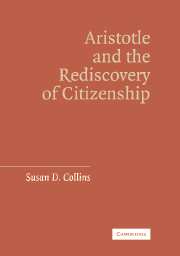Book contents
- Frontmatter
- Contents
- Acknowledgments
- Aristotle and the Rediscovery of Citizenship
- Introduction: The Rediscovery of Citizenship
- 1 Liberal Citizenship and Aristotle's Ethics
- 2 Citizen Virtue and the Longing for the Noble
- 3 Justice as a Virtue
- 4 Prudence, the Good Citizen, and the Good Life
- 5 Citizenship and the Limits of Law
- 6 Political Wit and Enlightenment
- Conclusion: Aristotle and the Rediscovery of Citizenship
- Bibliography
- Index
Introduction: The Rediscovery of Citizenship
Published online by Cambridge University Press: 17 July 2009
- Frontmatter
- Contents
- Acknowledgments
- Aristotle and the Rediscovery of Citizenship
- Introduction: The Rediscovery of Citizenship
- 1 Liberal Citizenship and Aristotle's Ethics
- 2 Citizen Virtue and the Longing for the Noble
- 3 Justice as a Virtue
- 4 Prudence, the Good Citizen, and the Good Life
- 5 Citizenship and the Limits of Law
- 6 Political Wit and Enlightenment
- Conclusion: Aristotle and the Rediscovery of Citizenship
- Bibliography
- Index
Summary
During an interview on the first anniversary of September 11th, author David Halberstam was suddenly moved to remark, “I used to say I was a New Yorker. Now I like to think of myself as a citizen of the city.” As a response to the attacks on America's most cosmopolitan city, Halberstam's comment spoke powerfully to the newfound sense of citizenship that then gripped the nation and has since struggled for definition. For what, indeed, does it mean to be a “citizen”?
To be sure, the events of September 11th and their aftermath have impelled all serious observers to speak anew of the sacrifices and duties of citizenship or of a deeper commitment to community. Beyond this, however, language often fails. With Rousseau, perhaps, some had sought to efface the very word citizen from our vocabulary, or, with Kant, to search out a higher notion of world citizenship, or, with Hobbes, to rest content as subjects rather than citizens as long as life and liberty were otherwise preserved. But if, in the face of present challenges, such notions seem inadequate – if, in particular, we are awake to aspects of citizenship that our own principles and assumptions obscure or resist – where might we turn for understanding? This study turns to Aristotle's Nicomachean Ethics and Politics, the two works in the history of political philosophy that together contain the most comprehensive and systematic investigation of the question “What is a citizen?”
- Type
- Chapter
- Information
- Aristotle and the Rediscovery of Citizenship , pp. 1 - 5Publisher: Cambridge University PressPrint publication year: 2006



